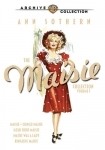| Reviews & Columns |
|
Reviews DVD TV on DVD Blu-ray 4K UHD International DVDs In Theaters Reviews by Studio Video Games Features Collector Series DVDs Easter Egg Database Interviews DVD Talk Radio Feature Articles Columns Anime Talk DVD Savant Horror DVDs The M.O.D. Squad Art House HD Talk Silent DVD
|
DVD Talk Forum |
|
|
| Resources |
|
DVD Price Search Customer Service #'s RCE Info Links |
|
Columns
|
|
|
Maisie Collection: Volume 1 (Maisie, Congo Maisie, Gold Rush Maisie, Maisie Was a Lady, Ringside Maisie), The
Gum-snappin', bracelet-janglin', ass-swingin' tough cookie-with-a-heart-of-gold Maisie is on DVD! Warner Bros.' own M.O.D. (manufactured on demand) service, the Archive Collection, which caters to movie lovers with a yen for hard-to-find library and cult titles, has released The Maisie Collection: Volume 1, a 5-disc, 5-movie collection which gathers together the first five movies in the well-remembered M-G-M programmer series, Maisie, starring sassy, sexy Ann Sothern. Titles included here are 1939's Maisie, 1940's Congo Maisie and Gold Rush Maisie, and 1941's Maisie Was a Lady and Ringside Maisie. As "B" programmers go, you're not going to find any overlooked masterpieces in The Maisie Collection: Volume 1. However, Ann "The Explosive Blonde" Sothern is a constant delight in these fast-moving, good-looking little M-G-M outings, and that's enough of a recommendation for any classic movie lover. A nice bonus for these good-looking transfers: an original trailer for each title.
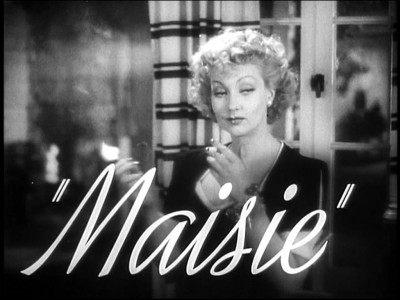
Metro-Goldwyn-Mayer, the "Tiffany" studio among the majors during Hollywood's golden age, always seems to be the last studio anyone thinks of when "B" programmers are mentioned. Of course they produced more than their fare share (even if status-conscious mogul Louis B. Mayer refused to use the pejorative "B" moniker); however, because M-G-M's "Bs" often looked and sounded like "A" efforts from the other majors, they occupy a strange limbo in movie history. M-G-M's "Bs" could often have bigger-name stars plugged in (to keep the expensively salaried actors busy), while Metro's vast production facilities, ready at a moment's notice like any good factory, added a professional, glossy, predictable sheen to these programmers that effectively disguised their tight shooting schedules and smaller below-the-line costs. Today, when "M-G-M" is mentioned, many moviegoers conjure up the big, high-status titles that symbolized the studio's opulent house style from its golden age, from classics like Mutiny on the Bounty and the Nelson Eddy/Jeanette McDonald super-spectacular musicals, to of course truly iconic works of art like the fantasy, The Wizard of Oz. What's fascinating about that perception, though, is that, at least by the time a successful "B" programmer series like Maisie came along in 1939, M-G-M was buttering its bread with those "Bs," and losing money on their huge, prestigious efforts like Marie Antoinette, The Great Waltz, Ninotchka, Maytime, Pride and Prejudice, Broadway Serenade, and yes, The Wizard of Oz. While those high-budget, big-star efforts, designed to impress the critics and overwhelm the audiences, brought back less-than-stellar grosses, L.B. Mayer (who, after the death of production head Irving Thalberg, pushed the studio towards conservative, reliable schlock for guaranteed, conservative profits) was pocketing big bonuses courtesy of "B" series like Andy Hardy, the Thin Man, Dr. Kildare, Tarzan, and even Maisie.
The few things I've read about the Maisie series mention that it was originally conceived as a vehicle for Jean Harlow...but since the first two movies in the Maisie series are nothing more than retreads of Harlow's earlier classic, Red Dust, from Wilson Collison's play (as well as his Dark Dame novel), I wonder if that fact hasn't been confused with the series' origins. What is clear is that contract star Ann Sothern, recently brought over from RKO where she had scored some good notices (but middling box office) in a series of Gene Raymond "B" comedies, was plugged into Maisie with the pre-planned hope of generating another lucrative series along the lines of the Andy Hardy pictures, with these efforts eventually geared towards the burgeoning female audience that would dominate the domestic box office during WWII. Such was M-G-M's "B" series fever at the time, Sothern was slotted into another potential series in 1939―the Damon Runyon-inspired Joe and Ethel Turp Call on the President, with William Gargan―which only lasted one outing. The Maisie series, however, proved to be remarkably resilient (considering it had no continuity or through-arc over its course; the reset button is pushed for each title), lasting for 10 pictures through 1947 (by which time "B" production was becoming economically less attractive), and solidifying Sothern's career (Sothern even took the popular character to radio for several years). Let's look very briefly at each of the titles here in The Maisie Collection: Volume 1 set.
MAISIE
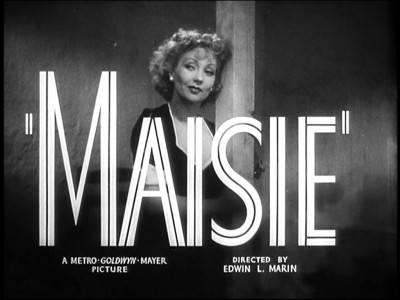
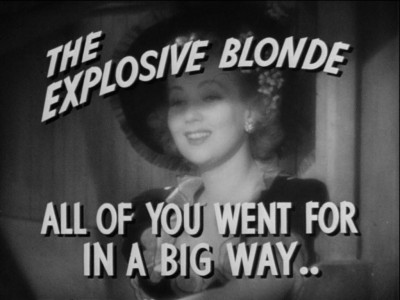
When showgirl Maisie Ravier, born Mary Anastasia O'Connor in South Brooklyn (Ann Sothern), arrives at the Big Horn Rodeo and Carnival in Wyoming, she has exactly 15 cents in her pocket book...and no job waiting since her would-be employer, Frawley's Frolics, folded up stakes after only one performance. Forced to talk her way into a carnival midway job from oily Rico (George Tobias), Maisie makes an annoying first impression on passerby Slim Martin (Robert Young), a ranch manager who holds no truck with dames. When a mix-up with thief Rico leaves Young thinking Maisie stole his wallet, Maisie is left with one option: stow away on Slim's truck back to the ranch. With no job there, she heads back to the railway station just in time to intercede Slim's ranch's owners: kind, gentle Clifford Ames (Ian Hunter), and his beautiful, distant wife, Sybil (Ruth Hussey). Maisie talks her way into being a maid for Sybil (who thinks the idea Slim's), so it's back to the ranch and angry Slim. Lucky thing, too, because Maisie just might save Slim's job at the failing ranch...and avert a disaster for him initiated by adulterous Sybil.
Scripted by Mary C. McCall, Jr. (A Midsummer Night's Dream, The Fighting Sullivans), who would go on to write all but two of the Maisie movies, and helmed by studio contract director Edwin L. Marin (1938's A Christmas Carol, Nocturne, Johnny Angel, Colt .45, Fort Worth), who would guide four of the titles in the series, Maisie's melodramatic story points won't surprise anyone who's familiar with moviemaking from this time period. Throwing in everything from tough-dame wisecracks and standard romantic comedy misunderstandings to Jiminy Cricket's Cliff Edwards' singing a song, infidelity, and even suicide, "subtle" Maisie ain't, that's for sure. But it moves along at a very fast clip (only 75 minutes), and with Sothern sassing the cast top to bottom, it's a perfect marriage between performer and character. McCall establishes the series' one repeating element: at some point in the story some guy is going to look Maisie up and down like a pork chop and try it on with her...but she'll turn him down flat because she may look cheap with her tight dresses and jangly bracelets, but she ain't "easy." Maisie may have come out long after the Production Code gutted sex from mainstream studio offerings, but you'd have to be a dope not to get what Tobias has on his mind when Sothern says she'll do anything for a job..."within reason," making a tired, cynical, disgusted face as Tobias checks out her, may I state quite clearly, sensational rear end (how many girls in the audience nodded right along with Maisie, wishing they could put their own creeps in their place with that much confidence?). Outside of the standard "M-G-M treatment" production values, where a simple Wyoming ranch looks like it was specifically designed for Architectural Digest (even Hussey's hurried rendezvous map to lover John Hubbard looks like a cartographer labored over it), Sothern is the whole show here, and she's a delight. Her entrance is a classic: sashaying down the street, swinging her hips and her bag, whistling with her head held up confidently, she may seem like a floozy, but she's really as honest and "good" as the day is long. Lots of funny wisecracks and tough talk here ("I'm too good-looking to be stranded in this cow town!"), with Sothern more than making up for glum Robert Young (yet again palmed off on a M-G-M "B"). A solid start to the series.
CONGO MAISIE
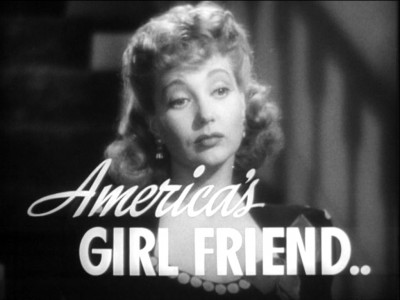
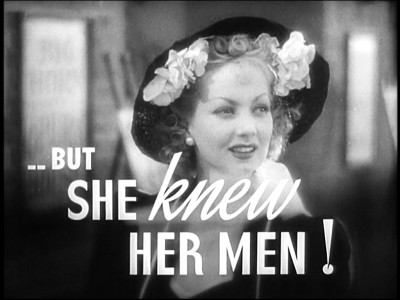
Kurmala, West Africa. Palace Hotel owner Horace Snell (E.E. Clive) has magician's assistant Maisie Ravier (Ann Sothern) locked up in her room for non-payment of her bill...but not so fast: Maisie lams it out the window. Meanwhile, on Captain Finch's (J.M. Kerrigan)'s river boat, Dr. Michael Shane (John Carroll) is traveling up-river to his rubber plantation, when he finds stowaway Maisie in his bunk. A blown boiler is the only thing stopping the Captain and Doctor from sending Maisie right back to Kurmala, so until the boat is repaired, Maisie accompanies Dr. Shane to the near-by government-run hospital compound, run by Dr. Jock McWade (Shepperd Strudwick) and his genteel, bored wife, Kay (Rita Johnson)―a compound in the deepest jungle that Dr. Shane used to manage. Dr. McWade is dedicated to his research on sleeping sickness, so Kay is neglected...until Dr. Shane starts paying attention to her, which a suspicious, disapproving Maisie notices in a Brooklyn second. Battling her own attraction to louse Dr. Shane isn't nearly as dangerous as the fate of the group when the natives get restless.
This even more blatant re-working of Red Dust, scripted by McCall, Jr. again and directed by series newcomer H.C. Potter, of The Shopworn Angel, Mr. Lucky, The Farmer's Daughter, Mr. Blandings Builds His Dream House fame (and who brings absolutely nothing new to this relentlessly "processed" studio assignment), has very little to recommend it: it's the weakest entry in this set. Certainly the familiarity with not only the far superior Red Dust but also Maisie, which was released only six months prior, does Congo Maisie no favors. Establishing a pattern that would hold at least through the first five of the ten movies, there is no continuity between Congo Maisie and the first outing. At the end of Maisie, Ann Sothern inherited a ranch and was all set to marry Robert Young. Here, no mention of the ranch, and no Robert Young. With ten entries in the series, this lack of a through-arc for the stories obviously didn't bother anyone at the time, but watching the movies all stacked together on this set, it is momentarily disconcerting to re-align what Maisie already did, and what's she'd doing new now. As for the movie itself, Congo Maisie is a rather dull affair, unfortunately. Its biggest drawback is there's not nearly enough Sothern in this romantic triangle-heavy story, and a Maisie movie without Sothern is fairly pointless (large parts of the movie go by with her off-camera, to the point where you forget you're watching a Maisie picture and think you're catching a sub-par jungle flick). John Carroll can't manage even second-grade Gable, so no sparks with Sothern, while Strudwick is certainly no Ian Hunter, so no real interest in the love triangle with Carroll and Rita Johnson. As for the stereotypical treatment of the native tribes, of course it's offensive...but no more so than your average Metro Tarzan outing. The advantage with those adventures were at least they were entertaining. Congo Maisie first ignores and then cheapens the independent, plucky Maisie character into a gimmicky plot device by having her "charm/scare" the wild-eyed natives with a haggard St. Louis Woman and a couple of improbable magic tricks (I thought she didn't have any with her?). Her character is completely secondary to the recycled, silly plot mechanics, and that spells trouble for a series that's so dependent on the lead actress carrying the show.
GOLD RUSH MAISIE
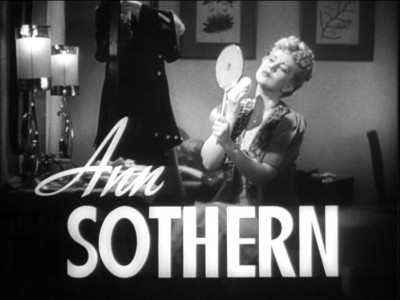
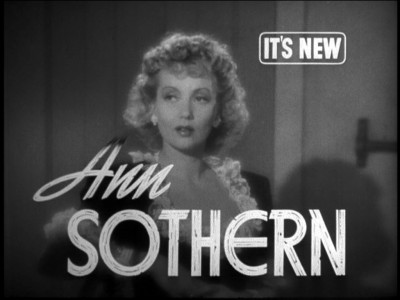
Out on a moon-lit deserted desert road, showgirl Maisie Ravier's decrepit car finally conks out. Making her way through a nearby ghost town, she spots a light in Bill Anders' (Lee Bowman) house. A hot-and-cold recluse who hits on an unresponsive Maisie, Anders tries to fix Maisie's car...before he kicks her off his property. Managing a lift into the nearest town, Maisie soon finds out that near Ander's place, gold was recently found, and that the whole area will soon be swarming with prospectors. Sensing an opportunity to ply her trade in the bars and saloons that are sure to crop up, Maisie hitches a ride with the Davis family (Virginia Weidler, Mary Nash, John F. Hamilton, Scotty Beckett), an itinerant family from Oklahoma who lost their farm and who travel from place to place, scratching for a buck. Maisie feels sorry for them, and vows to help them prospect....before she helps herself to Anders' land as a convenient spot for a campsite. The Davises do strike gold, but bigger complications soon appear.
Or...Maisie and The Grapes of Wrath. Gold Rush Maisie, directed again by Edwin L. Marin, with new team member Elizabeth Reinhardt (Laura, Cluny Brown) joining scripter McCall, Jr., diverts from the formula in two significant ways: no romance to speak of for Maisie, and a more serious tone to the proceedings. Some things haven't changed in Gold Rush Maisie; first and foremost, most men still want to sleep with Maisie the minute they see her (check out Sothern's hilariously disgusted face when the guy in the diner hits on her). And co-star Lee Bowman is no different; his mysterious hermit doesn't want to help Maisie at all when she knocks on his door...until her bitching and moaning amuse him to the point where he'd like to have a drink with her, sitting on the guest bed together. "Good girl" Maisie turns him down, of course, but unlike the first two entries, there's no final clinch between Bowman and Sothern―her "love" this time is for the Davis family. And while the Davis family may seem like a second-hand Joad family knock-off, their plight, while clichéd, is brought off with a surprisingly straight, sincere approach by the screenplay and Marin. Those going into Gold Rush Maisie may have thought they were in store for a comedy, but far more of it is dramatic than humorous, with hungry kids and despairing prayers to God for salvation an unusual addition to the series' supposedly light schematic. Even with that intriguing seriousness, though, a whole lot of Gold Rush Maisie doesn't make much sense, chief among the head-scratchers being the Anders character. At one point he tells Maisie he doesn't like people because of his father and brother...but absolutely no further explanation is given. He's a hermit...why? He likes Maisie and then he doesn't...why? He's completely inscrutable, giving one the feeling that there's no final romance with Maisie because there is no "there" there to the character. Other clinkers crop up here, including Maisie's troubling, confusing talk with child star Weidler, winding up with Maisie telling her not to take anything from anyone, lest you lose your independence...unless what you're taking is the best (huh?), and Bowman inexplicably morphed again into a benevolent deus ex machina to save the day for the Davises of the world. On the whole, though, Gold Rush Maisie is a formulaic little drama with an admirably straight face, and a welcome diversion from the series' standard play book.
MAISIE WAS A LADY
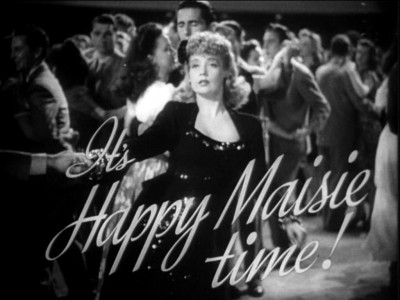
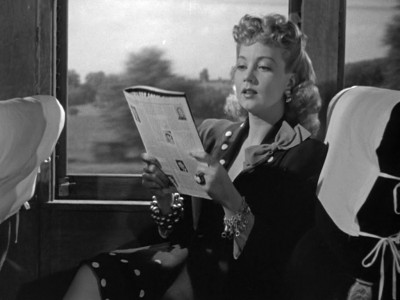
Drunken playboy Bob Rawlston (Lew Ayres) knows the local carnival's "Headless Woman" freak act is a fake, so he tickles her leg and ruins the illusion...while getting said woman, Maisie Ravier (Ann Sothern), fired. Feeling sorry for her, he loans her his car, whereupon she's promptly pulled over by a cop and arrested. Rawlston eventually vouches for her in court, but the fed-up judge comes down hard on the irresponsible Rawlston, ordering him to employ Maisie at Rawlston's mansion for 2 months as compensation. So Maisie's a maid for the Rawlston's, meeting Bob's delicate sister Abigail (Maureen O'Sullivan) and her slimy, player boyfriend, Link Phillips (Edward Ashley), who naturally hits on Maisie (who doesn't by this point in the series?). Luckily, Maisie finds a friend in sympathetic butler Walpole (C. Aubrey Smith, whom Maisie amusingly thinks is hitting on her, too!), but the swells do their best to put Maisie down, before tragedy strikes the whole family.
Utlizing the same writing/directing team as the previous entry, Maisie Was a Lady sticks with Gold Rush Maisie's more somber tone for this fast-moving story about those poor, emotionally stunted rich people saved by the honest, straight-talking, straight-shooting Maisie, who's better than a 100 of those wealthy "trash," as she calls them, put together―conventional movie wisdom that was typical Depression-era fodder. Maisie Was a Lady gets the nod for the best supporting cast in this DVD boxed set, with M-G-M "B" stars Lew Ayres from the Dr. Kildare series, and Maureen O'Sullivan, briefly grounded out of the trees from the Tarzans, lending some cross-promotional heft to the proceedings. While Maisie Was a Lady's story is fairly predictable (with O'Sullivan's suicide attempt a rather unsettling Victorian intrusion that shows just how retrograde and calcified Metro was becoming even at this late date), these pros, along with Sothern, of course, give the slim storyline its only worth. Ayres, still an idol to millions as decent, dreamy Dr. Kildare (before Ayres' conscientious objector status during WWII proved a publicity black eye for Metro), is quite funny in his opening scene, playing the drunken playboy squiring around a Donald Duck doll in the best screwball comedy tradition. Ayres' court sentence seems to indicate that Maisie Was a Lady is going to stick with that genre, conjuring up in the viewer's head all sorts of humorous and/or romantic complications that could ensue should the story concentrate on the fluffy structure of Maisie working as his maid (even better would have been more of Maisie and the delightful C. Aubrey Smith in sort of a reverse Pgymalion, with the starchy Smith getting "educated" by the sassy Maisie). However, the script becomes a tad sludgy as it continues, with shy O'Sullivan's romantic tribulations (roles like this made O'Sullivan bolt from her M-G-M contract), and Maisie's stout defense of the "little people," gumming up the comedy. By the movie's end, with O'Sullivan's suicide attempt, and Maisie rejecting her own love for Ayres, and Ayres chasing after Maisie, and the formula back on track with an impending marriage in the offing (...to be conveniently forgotten by the next installment), it's clear that Maisie Was a Lady's best moments were its lightest―at the beginning of the movie.
RINGSIDE MAISIE
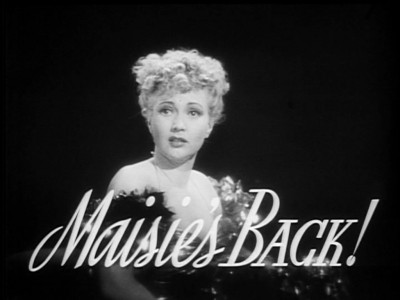
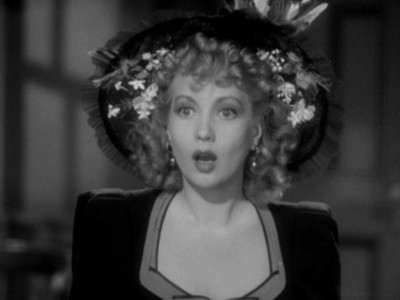
Dance hall girl Maisie Ravier (Ann Sothern) ain't gonna dance if she doesn't have to and besides her feet are tired so...she's fired. Calling up her agent Vic (Rags Ragland), she gets a line on an out-of-town apache dancer gig, but she can't afford the train ticket on account of she owes big-time on her rent, see? So Maisie tries to stow away on the train but is kicked off 15 miles from her appointment location. Luckily, good-guy boxer Terry Dolan (Robert Sterling) happens by during his roadwork and offers her a lift from following-behind trainer Chotsie (Slapsie Maxie Rosenbloom). Now, Dolan's manager, wise-crackin' Francis Xavier "Skeets" Maguire (George Murphy) ain't having none of that from a gold-digger like Maisie. But with the apache dance routine falling through (her potential partner, naturally, requests sex from Maisie in exchange for the job), Maisie relies on Dolan's kindness, which includes taking a job as caregiver to his saintly mother (Margaret Moffatt). Once Dolan, a.k.a "Young O'Hara," cleans up in a big match, everyone is in clover, including Skeets, who takes a shine to Maisie. But when Dolan confides to Maisie that he doesn't really like to fight, all hell breaks loose.
Or...Maisie Meets Kid Galahad. Yet another reworking of a previous big hit (which was S.O.P. at Metro, as with the other majors), Ringside Maisie scores because Sothern finally has a smart-mouthed wiseass to bounce off of: entertaining Murphy. Sterling, who would become Mr. Ann Sothern in real life two years later, is earnest but dull as "Young O'Hara," so we wish that Ringside Maisie focused on Murphy's and Sothern's romance rather than the familiar boxing story. Virginia "Frozen Face" O'Brien has a brief but funny number, Only a Bird in a Gilded Cage, while Rosenbloom looks a little lost. These kinds of boxing sagas from this period always work because the expected, welcomed cliches prove to be so satisfying; even pushing the thematic bounds to out-and-out melodrama when Sterling hits the mat and wakes up blind doesn't faze the "B"-loving viewer. Add to that Sothern clearly enjoying her sparring with worthy opponent Murphy, and Ringside Maisie crackles whenever they're on screen (a nice addition acknowledging Sothern's obvious sex appeal: director Marin focusing his first shot on Sothern's rear end during an energetic jitterbug). The comedy has been largely left behind again (is it really accurate to call the Maisies a "comedy" series?), but as with many satisfying "B" outings, familiarity bound to brevity gives the viewer a pleasing little jolt.
The DVD:
The Video:
For the most part, the five titles here in The Maisie Collection: Volume 1 look quite good. The full-screen, 1.33:1 black and white transfers are relatively sharp (Ringside is very sharp), with decent blacks, minor screen anomalies, and no compression issues. Contrast varies sometimes from movie to movie, but overall, solid.
The Audio:
Volume seemed a little low on Ringside, but again, the Dolby Digital English mono audio tracks are completely acceptable, with low hiss and clear dialogue. No subtitles or closed-captions available.
The Extras:
Original trailers for each title are included on the discs. Nice.
Final Thoughts:
Nothing startlingly original here...but Sothern's a pip. The Maisie Collection: Volume 1 gives you a good look at the state of M-G-M "B" production pre-WWII, with glossy production values and slotted-in talent at the service of largely recycled (or largely cliched) material. And that's just fine, because these Maisies, while not groundbreakers in the laughs or tears department, deliver basic storytelling goods, anchored by a charismatic performer perfectly suited to her character. And what more could you ask from a "B?" I'm highly recommending The Maisie Collection: Volume 1 for fans of Ann Sothern and "B" movie lovers.
Paul Mavis is an internationally published movie and television historian, a member of the Online Film Critics Society, and the author of The Espionage Filmography.


|
| Popular Reviews |
| Sponsored Links |
|
|
| Sponsored Links |
|
|
| Release List | Reviews | Shop | Newsletter | Forum | DVD Giveaways | Blu-Ray | Advertise |
|
Copyright 2024 DVDTalk.com All Rights Reserved. Legal Info, Privacy Policy, Terms of Use,
Manage Preferences,
Your Privacy Choices | |||||||









